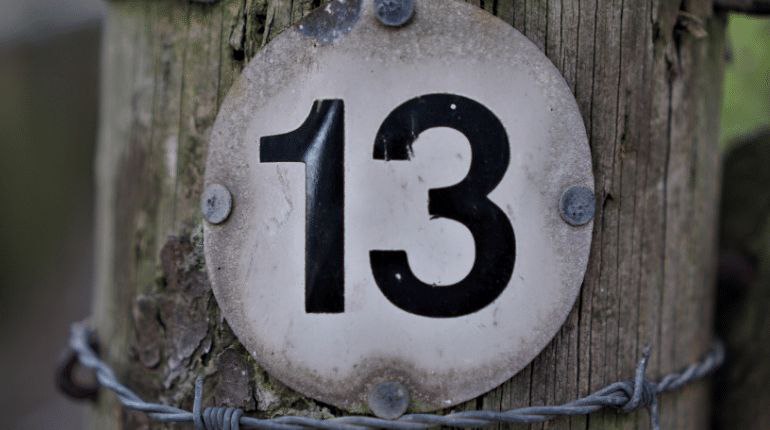
Friday the 13th, often surrounded by mystery and superstition, is considered by many to be a day of bad luck. In 2022, there was only one Friday the 13th; last year there were two, and this year we will also have two: Friday, September 13, followed by Friday, December 13, 2024. These dates are marked with a black cross on the calendars of those who fear them, as the fear of Friday the 13th has a name: paraskevidekatriaphobia. The term comes from the Greek words ‘paraskevi‘ (which means Friday), ‘dekatreis‘ (which means thirteen), and ‘phobos‘ (which means fear). This word was popularized by writer Stephen King in a New York Times article published on April 12, 1984, just before a Friday the 13th, where he humorously revealed his own fear of this cursed number. In this article, we explore the mysteries surrounding this infamous day.
I - The origin of the Friday the 13th superstition
As is often the case with legends and traditions, the origin of the superstition surrounding Friday the 13th is closely linked to Christian tradition. According to the New Testament of the Bible, during the Last Supper, which was Jesus’ final meal with his apostles, there were thirteen people present, including Judas Iscariot, the apostle who betrayed Jesus, leading to his crucifixion… on a Friday. However, the misfortune associated with the number 13 is not limited to Christian tradition; it also has roots in Norse mythology. For example, in the TV series Vikings by Michael Hirst, Loki, the god of discord, crashes a banquet held by Odin, the Father of the Gods, as the thirteenth guest and ends up killing Baldr, Odin’s son.
Even today, the number 13 is often considered a sign of bad luck, especially in the context of meals. According to superstition, when thirteen people gather for a meal, the youngest guest is supposed to be the first to die. This is why, in the Middle Ages, some hostesses never invited more than twelve guests. The writer Laurence Caracalla, in her book ‘At the Origins of the 100 Superstitions That Haunt or Delight Our Daily Lives’, found an explanation for this theory, noting that hostesses avoided inviting more than twelve people primarily for practical reasons, as their service only included twelve plates. Lastly, some claim that the fear of the number thirteen dates back to Antiquity. At that time, the number twelve was considered a symbol of perfection, as seen in the twelve months of the year, the twelve hours of the day, the twelve hours of the night, the twelve tribes of Israel, the twelve Olympian gods, and the twelve labors of Hercules, not to mention the twelve signs of the zodiac. In this sense, the number thirteen, which follows this perfect number, could be perceived as a sign of misfortune disrupting harmony.
II - Friday the 13th: a day of bad luck?
Friday is also a day rich in symbolism in Christian tradition. It was on a Friday, Good Friday, that Jesus Christ was crucified after being betrayed by Judas. In the United States and England, this day is associated with hangings because public executions took place on Fridays. In the Middle Ages, it was considered the witches’ night, and some biblical interpretations even suggest that Adam and Eve ate the forbidden apple on a Friday and that Cain killed Abel on the same day. Regardless of its exact origin, the fear of Friday the 13th has persisted for centuries, reinforced by tragic events occurring on this day. We remember the attacks on November 13, 2015, in Paris, which resulted in 130 deaths and 413 injuries, the sinking of the Costa Concordia on January 13, 2012, which caused 32 deaths, and the crash of Uruguayan Air Force Flight 571 on October 13, 1972, which crashed in the Andes, killing 17 people.
Some people are so affected by this date that they develop paraskevidekatriaphobia, the fear of Friday the 13th. It is difficult to quantify the exact number of people truly affected by this syndrome, which is not listed in any scientific glossary. According to psychologist Laurie Hawkes, it is not a phobia in the classical sense. ‘The irrational fear associated with Friday the 13th is more about magical thinking, a remnant of our childhood. Superstitions and beliefs, even the most improbable ones, influence our psyche by providing a form of reassurance, as anything seems possible when we indulge our imagination. In fact, in some contexts, the number 13 can also have a positive connotation,‘ explains the specialist, who notes that she has never encountered a case of paraskevidekatriaphobia in her nearly 20 years of practice.
III - What if Friday the 13th Were a Day of Good Luck?
While some people firmly believe in the misfortune associated with the number 13, others see it as a day of good luck. For them, Friday the 13th is a positive date, an idea rooted in Greek mythology where the day is dedicated to Aphrodite, the goddess of love. In France, this superstition is often leveraged by gambling companies such as La Française des Jeux, founded in 1933. On every Friday the 13th, lottery games offer larger jackpots. Since 1991, the French have participated in the Super Loto on Friday the 13th, with a notable increase in the number of players on this day. Jackpots can reach several million euros, like the Super Loto jackpot for this Friday, September 13, which stands at 13 million euros.
Friday the 13th remains a day surrounded by mystery and contradictions. For some, it’s a dreaded day, laden with superstitions and unfortunate events, while for others, it’s an ideal day to seize opportunities and chances. It’s a bit like the money transfers you can send from Canada to Africa for free, simply by using Transfergratis! So take advantage of this Friday the 13th to save money by sending more to your loved ones, all at today’s rate. It’s fast, secure, and above all, 100% free!







